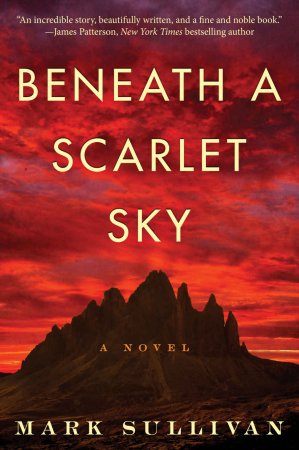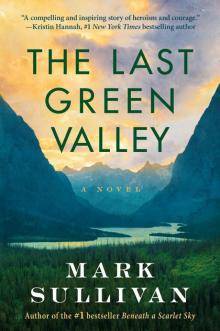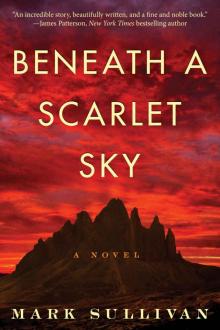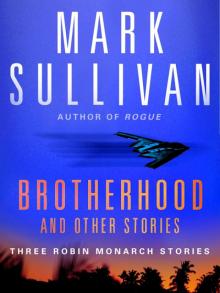- Home
- Mark Sullivan
The Purification Ceremony Page 7
The Purification Ceremony Read online
Page 7
I moved harder now. Within a couple hundred yards I found where they had mated before splitting up again. The buck's tracks were fresher, perhaps a half hour ahead of me. I shed my jacket, switched the compass to my red fleece vest and strapped the jacket to the pack. Almost unconsciously, I snapped off a spruce twig and placed it inside my shirt next to my skin. It was something my father had taught me; Penobscot hunters believed that when running after game the spruce twig would prevent pain in the side. I ran now and as I ran, it was as if my father raced beside me.
Mitchell had taught me to track, but my father had taught me to run. He'd weighed more than two hundred pounds, but he could stream through the woods in total silence, as if he were not on his feet but swimming through liquid air. I felt him around me now, coaching me to scan the woods as I moved, to consider how the wind brushed my face and how the rifts in the snow warned me of fallen limbs.
The tracks broke east after another half mile. I stopped, studied the map and figured that within minutes the buck would reach the confluence of the Sticks and the Dream. The water would be rough there. No way to cross. The deer was ahead, close. Cornered.
The open timber shifted to thick spruce growing along the base of a ledge that rose in places to thirty feet or more, a cliff in some spots. I pictured the hands of a clock. I made myself the clock's hands, creeping forward so slow you might not have seen me move, searching between the trees for a vertical line, a white patch, a round black nose, anything that might give the deer's position away. I eased around the front of a blowdown and BRRRRRRR! a grouse flushed from beneath the dead limbs, and I jumped back. My knees jellied and I sat down hard on the tree trunk.
I closed my eyes for several moments, then opened them and followed the line of the deer's tracks ahead for several yards. My heart sank. He was circling!
Until now, the deer had run with his attention into the wind where his nose might warn him of danger. He'd stopped here, however, and turned to check his back trail.
Then he'd made a tremendous leap up onto the ledge and gone south.
I sprinted along my back trail, ignoring the spruce limbs that clawed at me, stopping to search the cliff top at every opening that afforded a view.
I was passing through a small clearing when, up on the ledge, dark, wide antlers spilled snow. The buck gathered his legs underneath him, the muscles of his haunch and shoulders twitching like springs coiled too tight.
I went to one knee, the safety off and the rifle coming in one motion to my shoulder. I floated the muzzle, searching for him in my scope. The buck bounded just as I got a sight picture.
And then there were only trees and snow trailing in the air and mystery where the buck had been. I'd had fur in the sights, but not the high shoulder shot, the shot of instant death that I wanted. I owed the animal that. I eased the safety back on, unable to rise; that was one of the biggest deer I had ever seen. When I had my wits back, I told myself I would follow him again. Yet I knew he was alert now, running hard; I doubted I'd see him again today.
Sure enough, he had gone out from the dark growth in jumps of twenty feet and more. He'd halted once as he returned to the open timber, checked his back track, then lit out again, traveling almost due south at a trot. I jogged his tracks for almost an hour, trying to learn the cadence of his moves. I'd had my best chance already. But if I could keep the pressure on him, I'd begin to learn his reactions, his way. He might make a mistake.
The buck backtracked twice, once coming full circle right in my boot tracks. At two o'clock I heard more shots in the distance. By two-thirty I began to see the deer's pattern: he circled only when he had the opportunity to take to higher ground, almost as if he wanted to get above me to watch me come by. Indeed, once I found where he'd lain behind a log, his head thrust into a branch where his antlers would fit in. I laughed at his audacity: he'd been watching me pass him not fifty yards away.
I abandoned the track at three-fifteen, figuring to return to the area the next morning. I had nine days left and had come close already. I was in no hurry.
From the map, I figured I was about two and a half miles from the rendezvous point. I moved in a lazy zigzag pattern across the flat, keeping the faint buzz of the Dream on my left. I felt golden inside. Gradually, as I'd engaged in the dance with the deer, my thoughts of home—of Patrick and Emily and Kevin—had faded until they were but shadows behind me. I walked within the world of ghosts now. My parents and Mitchell had given me the skills to move freely in the wilderness, to sense a world invisible to most. I wondered, however, if I'd ever be free of the things they'd done in homage to that world. I shook my head at the notion and admitted that for all the healing I'd done this day afield, I was not ready to face the bloody issues of the past.
Instead, I forced myself to dwell on the woods before me, to be Little Crow again, as if that sort of limited awareness were therapy. The snow had picked up. The wind, too. The color of the tree trunks had changed toward a darker pewter as the light began its first fade toward darkness. I came upon the yellow flagging tape and then my own faint, almost snowed-over boot tracks from the morning. I slung the rifle and ambled down the trail, seeing it fresh. And it was. The falling snow had weighted the branches even more, making the trail almost tubular. Inside, the gray light made it difficult for me to judge depth. I moved slower, unsure of my footing. I ducked under a pine sapling bent almost in two. My shoulder nudged it. The tree sprang upright, showering snow around me. I took a couple of steps forward, wiping the bitter flakes from my face, and stopped short.
Blurred by an inch of new powder were other boot tracks bisecting the trail. I knelt to look at them. They were much larger than my own and I tried to remember the size of Patterson's boots. The guide was of average build. The boots that had made these tracks were at least a size eleven, bigger than what one would associate with someone five-foot-ten.
Then again, how strong was the relationship between height and foot size? These tracks could very well be Patterson's. There was also the possibility that one of the other hunters had abandoned his stand and worked his way this far east.
I was about to walk on when I noticed snowed-over deer tracks that the boots had obscured. They were big tracks. Buck tracks. And beyond that, difficult to see at first because of the light, a dark splotch of color under the snow. I brushed aside the top inch to find blood. I dipped my finger under it and brought it up for a closer inspection. Dark blood. Liver shot. A liver-shot deer is a dead deer. But he can run far before expiring.
Ten minutes to four. Forty minutes until last light. I decided to follow, to see if I could help find the wounded deer. My father and Mitchell had taught me to never leave a wounded animal in the woods. It was worse than unethical, it was a sacrilege. The deer gave its life so that I might live. To leave the deer to waste would ensure the fruitlessness of future hunts.
So I pushed my way through the thick poplar, finding more blood and more tracks. I climbed a small ridge, heading due east toward the Dream, and down the other side into a broad ravine. There was a creek bed underneath the snow and I worked my way across it, mindful of the icecovered boulders below.
On the other side, the tracks angled south toward the lake for a hundred yards, then climbed east again toward a second small ridge. It was steep. The snow had piled deep against the embankment. I waded forward to grab hold of exposed root systems and used them as a ladder. Inch by inch, I hauled myself higher, seeing more blood where the deer had fallen, until the land leveled.
I stood on the rim of an open depression perhaps twentyfive yards across. Tall larch trees, like sentinels, hemmed the clearing. The snow in the first third of the shallow bowl remained pristine. Blood stained the middle of the next third, then mushroomed to paint the entire rear of the depression the tint of rain-soaked apples. Steam rose from the gut pile at the crown of the mushroom, though the falling snow was cooling the sack rapidly. Soon the scavengers could come for the offal. A few more inches of snow and the blood colo
r would turn rose, pink and finally white again. Purified.
Reflexively, I bowed my head. I gave thanks to the forest for having offered up the animal. There was a trough in the snow running out of the bowl where the hunter had dragged the gutted deer. If I hurried, I could be of help.
I frowned as I ran. There was deer hair in the drag mark, but strangely little blood. No matter, it was easy going in the shallow snow under the thick conifers. And then the ridge angled downhill and the going was easier still. Here in the thicket, it was hard to believe there was a storm intensifying, that anything could be wrong with the world.
Around me, the retracting daylight calmed the forest until all was a deep, almost funereal silence. My pace quickened; I slipped farther and farther down the slope with every stride. I remember thinking that no one had a chance of catching me when I felt like this.
Eventually I emerged into a section where the trees had been thinned by fire. Blackened stumps crested the snowbanks. There were no branches on the standing trees for the first thirty feet, just charred nubs. Far out in the blasted landscape, a white owl launched from behind one of the stumps. It held a red squirrel in its talons. The owl cut the air with quick punches that broadened into sweeping strokes.
The raptor angled between the charred trees, melting with every wingbeat until its body was indistinguishable from the storm. And then there was just the dark speck of the squirrel floating in the sky. And then nothing.
The drag trail skirted the edge of the burn and passed back into enormous timber. I had gone perhaps two hundred and fifty yards beyond the burn when far down the slope I made out another opening, the log landing, and in it the orange Piston Bully snowcat. I peered down, looking for Patterson. No movement. No sound.
I followed the drag marks another seventy feet as they wound through the thick tree trunks, and then they stopped and went no farther. No tracks, no beaten-down trough. Nothing.
It was gusty here, some kind of funnel that constricted the wind and gave it bursts of abnormal speed. The snow swirled in miniature white cyclones, then died, then lived and spun again. I looked all around me. Downhill to my right I could see the snowcat plainly. But there were no tracks going toward it. I walked a wide circle around the last tracks. Nothing. And now the wind had blown in so much snow that my own prints, made just seconds ago, were almost gone.
I was about to head down to the Piston Bully when out of the corner of my eye I noticed a fresh daub of blood. I squatted. Another blood spot appeared suddenly, perfectly round at first, then the sharp edge giving way to red gnarled fingers as the blood ran into the veins of the snow surface.
Something heavy made a splat noise on the bill of my wool cap. A third spot appeared on the snow. I looked up in wonderment and the whole of my center wrenched sideways like a fault line giving way, the shock waves roaring outward, knocking me backward and flat.
Headlights sliced at the gloom. The snowcat lurched from my control. I sideswiped a tree before getting the machine back on track. I jammed down on the accelerator, using the scream of the diesel engine the way my daughter, Emily, used her baby blanket, as a buffer against all the fears in the darkness. Where was Griff! I had to be close to where we'd dropped him off in the morning. Where was he?!
A fawn appeared in the middle of the road, frozen by the oncoming headlights. I slammed on the brakes, expecting her to run. Instead, the young deer peered lovingly at me. For an instant it seemed that she had been waiting for me. Pressure built behind my eyes. My stomach twisted. I lurched from the driver's seat out into the snow. I vomited.
I crouched outside the headlight glare, unable to shake the terrible scene that had just unfolded before me on the ridge above the log landing. I'd lain in the snow for several minutes, staring at the base of the tree trunk, unwilling to look skyward again, holding tight to disbelief, holding tight to a vision of the forest as beautifully ordered, not brutally arbitrary like this. And then cutting through the haze was the unreality of the cold blue cast of Patterson's eyes gazing, unseeing, at me. His expression, even behind the blood that matted his fine blond beard, was at once comical and unbelieving. The young guide had been scalped, gutted and hung from the tree like a deer.
I knew I had to cut him down, as if taking him from the branches would somehow make what had happened endurable. I went to the tree robotically and searched with my flashlight until I found where the yellow nylon rope had been lashed to a lower branch on the back side of the tree trunk. The knot freed and Patterson's weight shifted to my arms. The insistent pull of the other end of the rope opened me wholly to the horror, and I heard a moan roll from my chest.
Patterson settled on his side in the snow, naked from the waist up, bootless. The flesh on his head was raw and bleeding. A stick lodged between the two sides of his rib cage held his chest cavity open. The tail feather of a red hawk had been lodged between his upper front teeth.
There was an agony and a loneliness and a hatred in the wind around me I had not felt since my mother died. I wrenched the feather free. I threw it in the snow. I kicked at it, hearing Patterson talk of his baby earlier that day, and I kicked at the feather again. I saw Emily and Patrick before me. I wanted to hold them until all of it—the guide, the blood, the flayed flesh—disappeared.
Then the state of shock that had allowed me to do all this evaporated. Panic embraced me. I'd lurched from the body, grabbed my gun and fell down the hill toward the snowcat, feeling the sickness swell in me.
The fawn was gone by the time I'd gotten back to my feet. I threw the machine in gear, telling myself if I could get to Griff or the lodge, I'd make it back home to my babies, back to where I belonged, the near past and the long past buried where it belonged.
No more than a quarter mile down the trail, Griff stepped out of the darkness. He had his hat in his hand. His thick white hair was matted with sweat. He squinted and waved his hat at me when I stopped. I jumped from the cabin and rushed to him sobbing. "Oh, God. Oh, God, Griff, they hung him from a tree . . ."
I collapsed, shaking in his arms. He pushed me back. "Who's hung? What tree?"
"Patterson. He's dead . . ."
My throat closed. The arms and chest of Griff's white camouflage suit were smeared with fresh blood. I struggled free of him. I ran.
Griff was right behind me, calling, "Diana! What the hell . . . ?"
My fingers closed on the rifle in the passenger seat and I swung the muzzle toward him, thumbing the safety off. "Don't take another step, Griff. I swear I'll shoot."
The gun trader's jaw dropped. His hands went up. "Calm down, now. No one's gonna get shot here, least of all me. I don't know what you think I've done, but . . ."
"The blood on you," I said. "It's fresh."
His attention shifted briefly to his chest, then back to me. He attempted a smile. "Well, I hope so! Just over there is a giant nontypical whitetail that I arrowed about two o'clock this afternoon. It took me hours to drag him out here. Look at me, I'm soaked."
I studied him uncertainly. "You could have run to get here. It's less than three miles from where I found Patterson."
"Run?" He chortled. "I'm pushing sixty. Young lady, I don't run three miles through snow for anything or anyone."
I couldn't reply; I could still smell Patterson.
Griff lowered his right hand. "Let me get my flashlight. I'll show you the buck."
I hesitated, then said, "Slow."
He fished around in his pants pocket, brought out a flashlight and flicked it on, then played it over the ground toward an opening in the brush line. I caught the glint of thick antler. Griff's bow lay on top of the animal. "Only shot once today," he said. "You can check the quiver."
I engaged the safety. I lowered the gun. "No, I think we should get Cantrell."
A half hour later, the outfitter knelt by the body, scratching at his beard, his baseball cap pushed back so it stuck almost straight up in the air. He touched where the rope had been threaded behind the guide's Achilles tendon
s. He jerked his hand back as if the rope were razorsharp. "Well, then," he said, rising from the body and twisting his leather glove violently with both hands. "What do you know about that? What do you know about that?"
We'd run into Cantrell halfway back to the lodge. We were so late he'd gotten worried and come looking for us. Cantrell blew out his breath several times as if to control himself. At last, he lifted Patterson's arm. Our flashlight beams crisscrossed on the slender wound in the guide's lower back. Cantrell's expression got hard and I knew what he was thinking; a hunting bullet made a small hole entering, then it mushroomed and created a much bigger hole exiting. It killed by impact and shock. This was different.
Cantrell rolled Patterson over. A similar slit showed just above his right hipbone. Hemorrhage wounds. Patterson had been shot with an arrow. I pointed my gun at Griff.
"I never left my stand except to track my deer," he protested.
Cantrell had a pistol out now. "We'll be checking on that."
"Do it. And quick with the snow falling, or my tracks will be memory," Griff urged. "Besides, who's to say it wasn't you, or you? He was scalped—that's what Indians do to their enemies, Little Crow. Wasn't it?"
"It's also what white soldiers did to Indian women and children," I snapped. "Not to mention the soldiers who used our women's breasts for hats and our boy's scrotums for change purses!"
Griff's lips quivered. "I'm sorry. I didn't mean . . . it must be someone from outside."
Cantrell had been watching us. "Too far to come in from outside. So I figure it's still you."
"Why?" Griff demanded. "I've got nothing against this kid. And if I did want to kill him, why would I hang him in a tree where Diana could find him?"
" 'Cause maybe you wanted her to find him," Cantrell said. " 'Cause maybe you're a nutcase."
Griff retorted, "Just go check my tracks. Check my bow." "I'll need all your arrows," Cantrell said.

 Beneath a Scarlet Sky
Beneath a Scarlet Sky The Last Green Valley
The Last Green Valley Beneath a Scarlet Sky: A Novel
Beneath a Scarlet Sky: A Novel Brotherhood and Others
Brotherhood and Others The Purification Ceremony
The Purification Ceremony